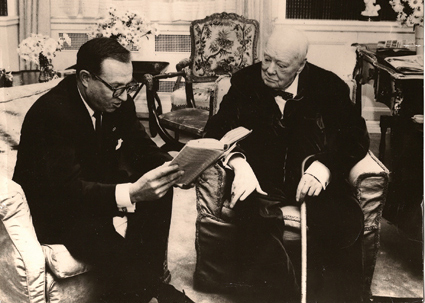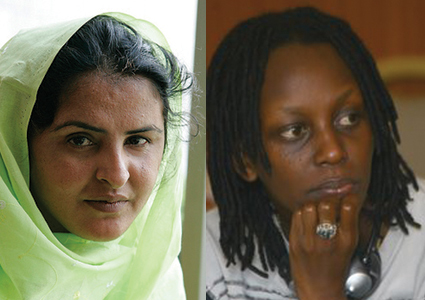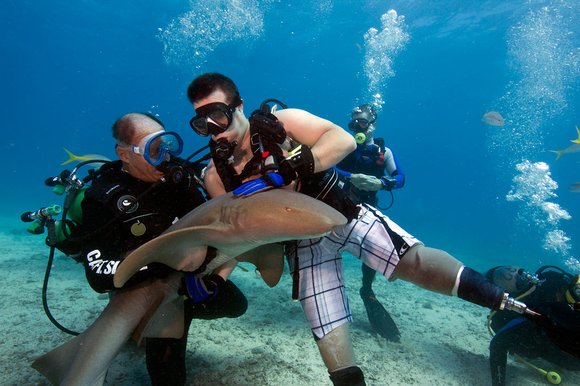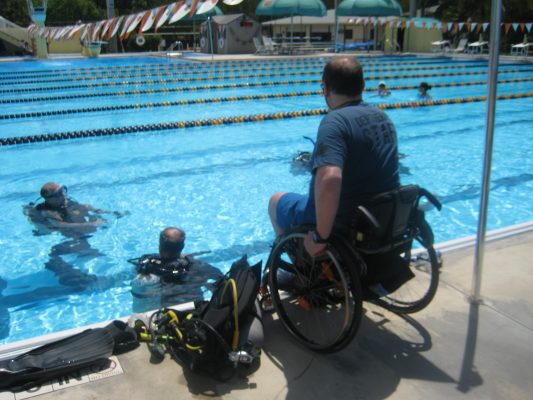The Al Jazeera producer Rosie Garthwaite draws on her experiences as well as those those of other battle-hardened foreign correspondents for her new book
It is a dusty but relatively cool Saturday afternoon in the Qatari capital of Doha when I meet Rosie Garthwaite at the headquarters of Al Jazeera English. The news studio where she works as an output producer for the Qatari-owned international news network is half empty after a long, feverish Friday. (Friday has become its busiest day since the ‘Arab Revolution’ began earlier this year, because crowds gather to demonstrate after sabbath prayers.) Garthwaite is exhausted. This is her sixth 11-hour day in a row, a day that began in the office at 5am. The stories that she produces can be about any subject, but the mainstay is Africa and the Middle East, and there is no sign that the region is calming down.
Garthwaite, in addition to her day job, has spent the past 18 months putting together her first book, How To Avoid Being Killed in a War Zone. She says she was prompted to do it ‘because so many of my friends spend so much time in dangerous places and they give me tips, or I’d want to give them a tip. And there is no book in the market that collates it all.’
In fact, a competing book by the former peacekeeper James Shepherd-Baron was published last year, and there are various survival handbooks by former SAS soldiers, though these tend to have more information about making fires with sticks than how to behave at checkpoints manned by drug-crazed child soldiers in sub-saharan Africa. For anyone thinking of working in one of the many parts of the world racked by conflict, How To Avoid Being Killed in a War Zone is a genuinely useful handbook, and the only survival manual to be written by a woman. It deals with certain practical concerns that few male security consultants may think of, but which many a female foreign correspondent has had to confront.
Garthwaite could have done with such a manual herself when she began her own career in journalism by simply turning up in Iraq in mid-2003 with a camera and a notebook. She had the good fortune to come out of the experience more or less unscathed. But the danger that covering war presents was underlined by the death in Libya last month of Garthwaite’s friend the photographer Tim Hetherington. ‘He was the best in his field,’ she says. ‘He was amazingly brave. Took us places we had never been before. He was my journalist hero.’
But Garthwaite says she does not believe that a proper war correspondent could have written this book. ‘When I interviewed boys and girls who have spent years in war zones they were all surprised themselves by how much they had to offer. I don’t think they would see a need for it, either; while I’m inexperienced enough to think there is a need for it.’
Garthwaite hopes that her book will be ‘as useful to a businessman in Colombia as to a journalist going to Kabul’, and believes that ‘in an ideal world it would be issued in every journalism school and on hostile environment courses taken by journalists and [people working for] NGOs.’ But the book is also a fascinating anthology of anecdotes by 150 experienced war reporters and aid workers. These anecdotes – including disturbing and revealing tales of close shaves at checkpoints, narrowly averted disasters, and kidnappings that ended in escape or rescue rather than Daniel Pearl horror – are the sorts of story that do not usually make it on to the news but which people who work in conflict zones tell each other over whisky in the quiet early hours.
Garthwaite, 30, grew up in London, went to boarding school (Benenden) at 11 ‘because I’d read too many Famous Five books’ and then to St Hugh’s College, Oxford. There she read ancient and modern history, with Alexander the Great as her special subject. Between school and university she spent a year in the Army. She chose to do a short-service limited commission – a gap-year programme that no longer exists – because ‘I wanted to see the world but I didn’t want first to spend six months in King’s Road working in some hideous pub earning £3.50 an hour.’
Though her father is in the marine insurance business and her mother runs art festivals, both her grandfathers were in the military. Her mother’s father, General Sir Harry Tuzo, was the deputy head of Nato. As a second lieutenant, Garthwaite served in the 3rd Regiment Royal Horse Artillery – ‘It’s as close to the front line as you can be as a girl’ – though the unit was not deployed abroad during her time in it. She was trained as a forward observation officer, but also edited the regimental newsletter.
Did she always want to be a foreign or war correspondent? ‘I wanted to work on the Today programme and I still want to work on the Today programme. I do television only because I think you have to know it all. On the other hand I wanted to be like the people whose books I’d read, people like Jon Swain and Kate Adie. I thought it sounded exciting and I thought I could capitalise on my army experience.’
Garthwaite was only 22 and two months out of Oxford when she went to Iraq. She was a freelancer without organisational backing who had never taken any of the ‘hostile environment’ courses that most news organisations insist their staff take before deployment in conflict areas. Within minutes of her arrival in Baghdad, ‘a white van came screaming up the road, and men in balaclavas shot a man in front of us.’ She was in similar proximity to violence and danger up to and including her very last day, when a car full of Italians in the front of her convoy heading out of the country failed to stop at a coalition checkpoint and was fired on, killing everyone inside. Despite this and other experiences, she says she does not think of herself as having been ‘a real war correspondent’ because the invasion and major combat operations were officially over by the time she arrived and, she adds, ‘because I’ve never been directly shot at’.
Garthwaite originally went to Iraq to join a small start-up English-language newspaper called the Baghdad Bulletin, though she soon started supplying photographs and stories to Reuters and other major outlets. ‘I was naive as a journalist but I probably had more street smarts than some of the others at the Baghdad Bulletin because of the Army.’ Funded by an acquaintance from Oxford, the left-wing Bulletin ran on a shoestring and all its staff were under 26. ‘We were all new to journalism and to the Middle East’, as well as to war zones.
Looking back, Garthwaite says, ‘I wish I’d known Arabic, and I wish I’d known how to prepare properly, the things to bring. I wish I had spoken to more people on the ground before I got there.’ One of the Bulletin’s contributors, Richard Wild, another ex-public school, ex-Oxbridge ex-soldier, was murdered within two weeks of arriving in the country. The Baghdad Bulletin shut down after six months. ‘We had a serious security threat and the embassy strongly suggested that we close,’ Garthwaite explains.
By then Garthwaite, who had gone down to Basra to be its local correspondent, was a much sought-after freelancer contributing to media around the world. For most of her time she was the only resident Western journalist in the southern Iraqi city, and her peculiar circumstances there gave her unique access and understanding of what was going on. When she arrived there from Baghdad by train, ‘there were massive riots going on’. A poor Shia family whom she had befriended on the train said it would be dangerous for her to try to get to the house she had arranged to stay at and took her to their home. She ended up staying with the family for an entire month, sharing one room with six women and one man, enduring the 40C summer heat with electricity for no more than an hour or so a day and no running water.
Her hosts were as fascinated by her as she was by them. Garthwaite laughs as she remembers how, amid the casual nudity of the women’s area, her host’s wife and daughters were shocked by her body hair, their own bodies having been depilated to perfect all-over smoothness: ‘They threaded like crazy – they would do it all the time.’
By the end of the month her phrasebook Arabic was up to GCSE standard and she knew more about what was happening in the streets of Basra than any other foreigner, including the British
military. ‘Several times the soldiers in the garrison would ask me for information about what was going on. I would sometimes call them for a response about a bomb and they would not have heard about it yet.’ It was through this family that Garthwaite broke one of her major scoops, the abuse and murder of an Iraqi civilian called Baha Mousa by British troops – a story she wrote about for Reuters and in The Times.
Garthwaite’s seven-month stay in Basra with all its dangers and privations is worthy of a book itself. She lived a much lonelier and harder life than most Western journalists in Iraq. And even though Garthwaite is modest about her own experience, some of the best stories in the book are hers. One of them tells of the time when she arrived at the UN compound in Baghdad just after it was destroyed by a huge bomb and tried to help a man with a large piece of shrapnel in his side. Because she had rushed out in a short-sleeve T-shirt she was menaced by a crowd that called her a ‘whore’.
At the end of 2003 Garthwaite left Iraq. An old spinal injury had reopened, leaving her in crippling pain. ‘Also I didn’t feel comfortable by myself any more.’ There were men hanging around near her house – ‘the people I lived with warned me not to go outside’ – and she was horrified to find that a hostile and anti-British taxi driver knew where she lived. ‘Two weeks after I left, the house was raided, my housekeeper Abbas was kidnapped and all the money I’d given him was taken away.’
After surgery and recovery, Garthwaite looked for a job. To her surprise her experience in Iraq counted for little. Eventually, in spring 2004 she was hired as an intern by the BBC in its current affairs division and was then promoted to staff researcher. In January 2006, having done some producing at the BBC, she took the chance to join the then nascent Al Jazeera English as a planner and fixer in London. Al Jazeera’s concentration on international news at a time when British and American outlets have cut down on their foreign bureaux was and is a powerful lure. Garthwaite became a full-time producer within a year, and in November 2006 came out to Doha to help with the channel’s launch.
About half the people sitting around her in the newsroom seem to be Westerners, including Nick Toksvig, the brother of Radio 4’s Sandi. The newsreader, David Foster, is English. But then from the very beginning Al Jazeera has been dominated by British journalists. The original Arabic channel set up in 1996 was largely the creation of former BBC staff, and the English-language channel was set up by BBC and ITN veterans given a lavish budget to hire staff from across the English-speaking media world. Among the better known names to join the fledgling network were Sir David Frost and Rageh Omaar. The British flavour at Al Jazeera English is still strong, although, as Garthwaite explains, many of the staff are Arabs who grew up in Britain or the USA or are half American or English. In Al Jazeera’s international atmosphere, she says it is easy for them, like Garthwaite, to feel at home. Although Al Jazeera has long been controversial, for Garthwaite its political perspective ‘wasn’t a major problem’, and she is quick to point out the differences between the English channel and its Arabic sister network.
Even after Garthwaite joined Al Jazeera English she had no plans or desire to move to the Gulf. And when she flew out to help with the launch, she thought it would be for only three weeks. It has now been four and a half years. Living in Doha is not easy. ‘I go to London and there’s all that culture and it is difficult to leave.’ Life here means going
to the same two or three restaurants over and over again, buying overpriced alcohol from the one licensed shop in the country, and ‘making bacon runs’ from non-Muslim countries. Because the majority of the population in Qatar are guest workers, Garthwaite does not even get to practise the Arabic she learnt in Iraq: ‘The languages you hear most are Tagalog, Hindi and Urdu.’
To stave off the tedium of expat life in Doha, and to keep her figure (‘people put on a stone when they come out here’), Garthwaite tries to make the most of the peninsula’s sporting facilities, when the weather allows. Despite her back problems, she waterskis and kayaks on the wide canal near her skyscraper home. She has a trainer, of course, plays tennis, does Pilates and has recently taken up golf. The ‘sport’ of ‘dune bashing’ in SUVs, popular among young Qataris and Western expats, is out of the question because of her back.
Garthwaite is giving away a third of her book’s profits to Médecins sans Frontières – ‘I feel bad enough using all of these other people’s experiences,’ she says. But she is also ‘thinking about writing another book’, planning a documentary for Al Jazeera about the ‘stem cell tourists’ who go to places such as India for experimental medical treatment, and hoping to get back in the field as Al Jazeera’s equivalent of a bureau chief in Africa or South Asia if a position opens up at the right time. The Today programme may have to wait.
How To Avoid Being Killed in a War Zone’ by Rosie Garthwaite (Bloomsbury, £12.99) is available for £11.99 plus £1.25 p&p from Telegraph Books (0844-871 1515; books.telegraph.co.uk)



